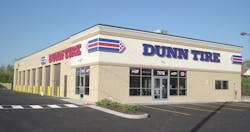From computer hard drives to retail stockrooms, space always seems to be at a premium. But making room to offer seasonal tire storage service can fill a marketplace need, add a revenue stream and increase customer retention.
Modern Tire Dealer called six dealerships in Minnesota and North Dakota, states known for harsh winters, to ask if storage of summer tires was available with the purchase of winter tires. All said no, citing lack of space as the reason. “We do not store tires. If we had everyone’s tires here, we’d have no place for new tires,” was the response from an employee of a Minnesota dealership. The person who answered the phone at a dealership in North Dakota said, “I don’t know of anyone here in town who does that.”
Why two dealers make space
Dunn Tire Service LLC of Buffalo, N.Y., decided to introduce an option for storing off-season tires in 2006. “It isn’t done by everybody, so it’s an opportunity to provide a customer service that’s unique,” says Patrick Logue, managing director of retail operations. To learn what providing the service involved, Logue visited Pneus Touchette Distribution Inc. of Montreal, Quebec, which has offered tire storage for many years.
When Dunn Tire rolled out its service seven years ago, it was almost an immediate success, according to Logue. Today, the company has 14,000 customer tires stored at its 31 locations in New York and Pennsylvania, and three warehouses in Buffalo, Rochester and Syracuse. The charge to store four tires is $39.96. The service is an additional revenue stream and much more. “It’s a great customer retention tool because once you have their tires and their wheels, there’s a real good chance you will keep them as a customer,” says Logue.
Unlike repair services, tire storage draws customers to a dealership for an optional service they want, creating a win-win situation for both parties. “The service helps you build a better relationship with customers and gives you an opportunity to look at their vehicles again.
“Some customers do not have space to store tires, some may have space in a garage but do not want to place tires in it, and others do not have means of transporting their tires. So tire storage service is a convenience for them.”
When tires are placed into storage, the company’s identification system generates a label with the customer’s name on it. When the customer is ready to swap tires, the identification system enables Dunn to retrieve the tires and have them at the shop in 72 hours or less.
[PAGEBREAK]
Dunn Tire is No. 35 on the Modern Tire Dealer 100 list of the nation’s largest independent tire dealers.
Belle Tire Inc. makes space for tire storage services in Michigan and Ohio, where it has 87 retail and combination retail commercial outlets.
“We operate a fairly substantial off-season tire and wheel assembly storage program,” says Jeff Kruse, senior vice president for Belle Tire.
The company calls its off-season storage service Tire Valet. The service involves inserting a customer’s tire and wheel assembly into a custom-designed storage bag at the Belle Tire store. A bar-coded label for each assembly is printed at the point-of-sale terminal and inserted into the valet bag. A description of the product and condition is recorded within the POS system. The valet bags are shipped on the next delivery truck to Belle Tire’s distribution center, where the bag’s bar-coded label is scanned into the company’s system. Each bag is opened and the tire and wheel assembly is washed in a special washer. The assembly is returned to the valet bag and the bag is scanned to a pallet and specific bin location for storage in the DC.
When it’s time to swap tires, a customer only has to phone or email any Belle Tire outlet to return his or her tires. The valet bag is shipped the following day to the retail store. The bags remain company property; the customer pays only for the service. Belle Tire charges $80 to store four tires per season. The price includes removing and reinstalling the assemblies on the customer’s vehicle as well as cleaning and storage.
“The assemblies are stored on standard 5x5 tire pallets on pallet racks within our DC,” says Kruse. “Each valet bag has a unique bar code and is scanned into a specific location in our DC. We certainly feel that this is a value-added service for our customers which helps to build retention.”
Belle Tire is No. 8 on the MTD 100. In October 2013, the company opened its newest store in Lapeer, Mich.
Finding space from a third party
In Denver, dealers are finding space for tire storage services through a company that offers wholesale storage capacity to providers of tires and tire-related services.
Mike Caplinger, the founder of Seasonal Tire Storage Inc., says close to 250 tire dealers, car dealerships and auto repair shops are referring their customers to him for storage of tires.
The family-owned business recently moved to a larger, climate-controlled warehouse, its fourth expansion since beginning operations in 2010. “Wholesale customers are generally tire sellers who want to resell our service at a profit to their customers at the point of the tire sale,” says Caplinger, who has 30 years of experience in the auto repair industry.
“They pay a reduced rate, but the tire owner is the tire seller’s customer, not ours. That means the tire seller’s shop maintains control over where the customer goes for their seasonal tire swap. That shrewd shop realizes a guaranteed two visits per year to inspect for brakes, shocks, or whatever else they offer, not to mention the profit from initially selling those winter tires.”
[PAGEBREAK]
Seasonal Tire Storage also markets pick-up, delivery and storage of tires directly to consumers. The company will transport tires to any location a consumer specifies in the Denver area for installation. Customers request transportation and storage of tires via phone or the company’s website, www.tirestorage.com.
“They contact us, often after being referred to us by their tire professional, and we make all the storage, transportation, and billing arrangements directly with that person,” says Caplinger.
“The retail customers pay our highest rate, and we’re obligated to transport their tires whenever and wherever they direct us to. That can mean that if their experience with a given store was unsatisfactory, they could direct us to take their tires elsewhere next swapping season.”
The company posts a list of recommended service facilities on its website. “There are tire stores that encourage tire storage and winter tire purchases,” he says. “If we believe a tire store is promoting the use of winter tires, we give them status on our website’s locator map.
“We take a look to see how well equipped they are before we include them on the locator. We want people to gravitate toward those shops.”
The company also developed proprietary software to manage and track off-season tires. The software archives images of a customer’s tires, creates documentation about a tire and its condition, and provides up-to-the-minute information on a tire’s status.
Caplinger sees opportunities for his company and tire dealers as the public becomes more aware of the safety benefits of winter tires. His long-range plans are to establish Seasonal Tire Storage operations in 36 markets. “The first new markets are likely to be Minnesota, Wisconsin, Michigan and Illinois because of the amount of winter tire use and the number of qualified inquiries. There is so much more people could know about winter tires that we believe the tire storage business has room to grow.”
People will pay for convenience
There has traditionally been a higher awareness in Canada than in the United States of the need for winter tires, according to Peter Gregory, president of Atlas Tire Wholesale Inc. He says that wherever there is seasonal business, there is a market for tire storage services. “You are selling a convenience, and people will pay for a convenience. You have an opportunity to fill a need and earn money off that service.”
Atlas distributes passenger and light truck tires, wheels and accessories to tire dealers, car dealers, auto repair shops and collision repair centers across Canada. The company is based in Ontario and serves more than 2,700 customers through four distribution centers.
Although Quebec is the only Canadian province requiring winter tires, Gregory says consumers use tire storage services throughout the country. “Pretty much everyone is offering some form of storage. There is quite a high concentration, especially in large metro markets across Canada.”
The size of tires is helping to drive demand for tire storage services, according to Gregory. “The Toyota Corolla and Ford Focus are coming with 15-inch tires. The Chevrolet Cruze is coming with 16-inch tires. There’s no room in the car to bring home the summer tires.”
The biggest challenge with offering tire storage services is always space, says Gregory. Some dealers use secure public storage units or lease warehouse space near their stores. The decision to store tires on site comes down to a realistic business plan. “If you allocate 500 square feet of floor space and put racking in, you should be able to get 500 tires there. You know what 500 feet costs you. You can charge a reasonable storage fee and even make a profit. The beauty of it is you store summer and winter tires.”
Software for off-season storage
Atlas doesn’t store tires for its dealers. However, it recently partnered with Tire Storage Solutions Ltd. (TSS), a company that provides software for tracking and organizing off-season tires. Gregory says he wanted to maintain his company’s focus on distribution while offering a storage option to dealers.
TSS software stores data on customers, storage location, tire changing appointments and tire/wheel status including condition, brand, model and size. The proprietary software also enables dealers to document damage to rims and tires. “If our clients have a storage solution, it helps them sell more tires, and that’s how we benefit,” says Gregory. Atlas introduces its customers to TSS, which bills customers direct, he adds.
TSS software is used in tire storage warehouses and car and tire dealerships across Canada, according to Christine Athron, TSS account manager. Dealers can monitor the condition of tires and wheels to inform customers of the need for replacements during the changeover process as well as alignment and balancing services. In addition, dealers who offer a storage service can better manage tire swap season by booking appointments before the first snowfall.
A new revenue stream that strengthens relationships with customers while generating sales of tire and repair services is a strong reason to consider making space for tire storage service. But the greatest incentive is increased customer retention, according to Athron. “Dealers are not paying marketing costs for a customer’s car to be in the shop twice a year on a hoist with a technician looking at it. There’s a lot of value for a dealership.” ■





